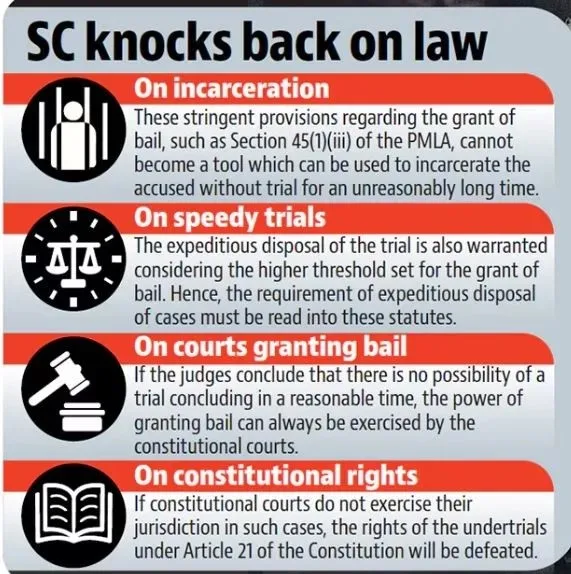Syllabus: GS2/Polity and Governance
Context
- A Delhi court granted bail to AAP leader Satyendar Jain, under Article 21 of the Constitution, arrested in a money laundering case.
About
- The Delhi court order highlighted that the constitutional conditions had a mitigating effect on the statutory conditions under Prevention of Money Laundering Act (PMLA) when liberty was at the core.
- The relief granted under Article 21 (right to life and personal liberty) of the Constitution pertaining to delay in trial and long incarceration is superior to the twin conditions under Section 45 of the PMLA.
- Article 21 applies irrespective of the nature of the crime.
| Prevention of Money Laundering Act (PMLA) 2002 – It was enacted by Parliament of India under Article 253 of Constitution in 2002 to prevent money laundering and provide for the confiscation of property derived from or involved in money laundering. – PMLA and the Rules notified there under came into force with effect from 2005, and it was further amended in 2009 and in 2012. Provisions: – Sec. 3 of PMLA defines the offense of money laundering as any process or activity connected with the proceeds of crime and projecting it as untainted property. – Prescribe obligation: PMLA prescribes the obligation of banking companies, financial institutions and intermediaries for verification and maintenance of records of the identity of all its clients. – Empowerment of officers: PMLA empowers Directorate of Enforcement to carry out investigations in cases involving offense of money laundering and also to attach the property involved in money laundering. – Special Courts: It envisages the designation of one or more courts of sessions as Special Court to try the offenses punishable under PMLA. – Agreement for Central Government: It allows the Central Government to enter into an agreement with the Government of any country outside India for enforcing the provisions of the PMLA. Bail Provisions under PMLA – The twin conditions of bail under Section 45 of the PMLA pose stringent thresholds for an accused. – For one, the person has to prove in court that he or she is prima facie innocent of the offense. – Secondly, the accused should be able to convince the judge he would not commit any offense while on bail. 1. The burden of proof is entirely on the incarcerated accused. |
Supreme Court’s Take on the Law
- The Supreme Court recently held that constitutional courts cannot allow provisions of the PMLA to become instruments in the hands of the Enforcement Directorate to continue incarceration for a long time.
- To address concerns raised by ED regarding possible tampering with witnesses or evidence, the court imposed strict conditions on bail, including:
- regular appearance before the deputy director of ED;
- appearance before the investigating officer of the scheduled offenses;
- restraint against contacting any prosecution witnesses or victims related to the scheduled offenses;
- full cooperation with the trial and a refrain from asking for adjournments.

Conclusion
- The court decision underscores the importance of preventing prolonged incarceration and delayed trials, balancing statutory conditions with constitutional rights.
- Ultimately, the balance between law enforcement powers and individual rights remains a critical aspect of this legal framework, ensuring justice while safeguarding fundamental liberties.
Source: TH
Previous article
Classical Status for Five Languages
Next article
India’s Sports Culture and Challenges